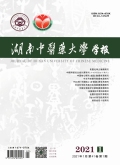湖南中医药大学学报2024,Vol.44Issue(1):65-69,5.DOI:10.3969/j.issn.1674-070X.2024.01.010
范伏元教授从"络脉不和"论治肺结节经验
FAN Fuyuan's experience in treating pulmonary nodules based on the theory of"collateral disharmony"
摘要
Abstract
Collaterals can communicate interior with exterior and connect viscera,through which qi and blood permeate all parts of the body.Based on these physiological characteristics,Professor FAN Fuyuan understands pulmonary nodules from the perspectives of"lung impediment"and"lung accumulation".Collateral disharmony is considered as the fundamental pathogenesis of pulmonary nodules,which is further expounded in two aspects,namely the latent pathogenic qi resulting in phlegm and static blood which obstruct the lung collaterals,and disharmony of the stomach collaterals causing phlegm and static blood accumulating in the lungs to form Kenang(mass of phlegm mingled with static blood).Therefore,dredging collaterals to unblock impediment and harmonizing wei-defensive qi and ying-nutrient blood to dissipate nodules,as well as harmonizing the stomach and expelling stasis,calming the mind and transforming turbidity are taken as the core treatment methods.Shufeng Xuanfei Decoction and Jiawei Wendan Decoction are always prescribed respectively based on pattern differentiation.With their definite clinical efficacy,Professor FAN combines the macroscopic pattern differentiation of zang-fu organs which aims to reconcile the viscera with the microcosmic pattern differentiation of collaterals which aims to harmonize wei-defensive qi,ying-nutrient blood,and body fluids flowing in the collaterals.关键词
肺结节/络脉不和/肺痹/肺积/窠囊/通络开痹/和胃逐瘀/范伏元Key words
pulmonary nodules/collateral disharmony/lung impediment/lung accumulation/Kenang/mass of phlegm mingled with static blood/dredging collaterals to unblock impediment/harmonizing the stomach and expelling stasis/FAN Fuyuan分类
医药卫生引用本文复制引用
刘峰,李妲,欧慧萍,范伏元..范伏元教授从"络脉不和"论治肺结节经验[J].湖南中医药大学学报,2024,44(1):65-69,5.基金项目
湖南省自然科学基金项目(2023JJ60243) (2023JJ60243)
长沙市自然科学基金项目(kq2202455) (kq2202455)
湖南省卫健委重点项目(202203023299). (202203023299)

